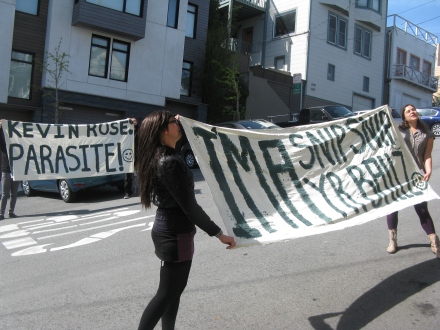Why are protesters in San Francisco attacking members of the new class of techno-entrepreneur?
To quote from their manifesto:
It has now come to the point where even Diet Coke advertisements are referencing the influx of techies and their startups. With venture capital in their pockets, these wealthy professionals with few attachments are able to pay hyper inflated rents and property prices, displacing long time residents and increasing the cost of living. Tech-workers on average earn four times the wages of a normal service worker.
Venture capitalists enable these tech-workers by funding their startups. With the success of each startup, more and more ambitious tech-workers flock to the city and displace underemployed service workers to the cities at the far reaches of the BART line. These workers must then commute back to San Francisco or Oakland every morning, in most cases to perform menial tasks for the entitled scum who drove them out in the first place.
Which brings us back to Kevin Rose, founder of Digg.com and current venture partner at Google Ventures. He has already helped Google acquire Nextdoor.com and invested his own money in Foursquare, hoping to cash out when a giant buys it. We are here today because a few of the thousands low-paid, underemployed service workers got fed up with Kevin Rose treating them like the shit one scrapes from their boot, not even worthy of eye contact or the basic pleasantries generally taken for granted in our culture.
Techies, because of the amount of time they spend staring into screens, tend to have poor eye contact skills. The autistic stereotype makes sense for startup workers who rarely socialize with other people except from behind screens, during stand-up meetings, or with the assistance of alcohol after hours.
They’re not rude, they’re just socially inept, which is close to the same as rude, but not quite as intentional.
This is a fight not just over money, but status.
In the Bay Area, one rarely just ‘gets coffee’ with a friend. An invitation to get coffee is really an invitation to discuss some business venture. These are the reasons why they don’t make eye contact with their baristas: but it so offends people that it has become a recurring theme in the complaints.
It’s funny that these protesters bring up Kevin Rose’s app Oink, because they are probably the only people to remember it in at least a couple years.
It should be obvious to anyone that the current boom in software has been driven by low interest rates and money-printing on the part of worldwide central banks. Part of the reason why this has been concealed is that, unlike the more recent housing bubble in the US, the inflation (creation of credit and cash) has been channeled mostly into stock markets both public and private.
Because most Americans are reprobates incapable of saving much money, this has isolated most of the gains through printing to the upper middle class and higher.
Venture capital benefits through a system of diversification in which large investors like pension funds, university endowments, and insurance companies devote a sliver of their allocations to VC firms. These VC firms then invest some of this money into startups, most of which fail.

The population of San Francisco is just over 800,000. This has made it fairly easy for a significant portion of the people there to be displaced by a relatively small number of small, wealthy companies moving there. This combined with an anti-development attitude and a Communist-leaning local government has made it difficult for the city to absorb the gold rush influx.
The general anger is understandable. The way in which it’s being expressed by protesters would not be tolerated in a civilized country, but the US is not a civilized country. The protest problem is just a symptom of more significant issues within the political structure.
Protesters are employing similar methods targeted to other individuals and companies, using social media to increase the targeting accuracy.
This is all an effect of an inflationary monetary system combined with a culture that encourages both envy, victim-worshiping, and uncritical acceptance of the structure and its distorting impacts on society. Almost no one active in business and politics today has a first hand experience of the pre-Nixon monetary system, much less the pre-Federal Reserve system. The mores and business practices of today are profoundly different from those that came before the major structural shifts.
The new class attracts resentment precisely because they gain access to the ‘new money’ years before those with fewer political connections do. Part of this is a democratic ritual that has been with the US since the founding, owing to the anti-inheritance laws that ensured that permanent classes would not develop into a new aristocracy (which Tocqueville commented on extensively in his travels during the post-revolution period).
The leveling effect that Keynsian policies are intended to have (by disrupting entrenched fortunes and cycling through business classes) has the unintended consequence of decimating the middle class, empowering new classes of foreigners, and crunching the proletariat. What has happened is that the former middle class gets trapped in the tax policies designed to reduce the large fortunes, while the large fortunes purchase exceptions, and the poor lose all security.
This is what the new class means by ‘disruption’ — they are disrupting the former entrenched businesses using a new wave of credit that has trickled to them through limited partners to the hands of venture capitalists to be invested in the little pirates who lengthen the capital structure.
We see this literally in the case of ‘software as a service’ and ‘cloud computing’ companies who cause capital equipment to be distributed around the world rather than being concentrated within geographical areas. Hidden security costs threaten the stability of this premature extension.
In the Bay Area, these protests represent a failure of governance, and a classic democratic failure mode. As the hot money leaks from the coastal cities into the rest of the country, we will see similar dynamics play out all over, until foreign policy breakdowns force the final reckoning upon the Americans.
Rather than pick up pennies in front of the steamroller off this inevitable event, it is better to prepare for the dissolution.

Civilization is first a crippling then a fatal pathology.
”The general anger is understandable. The way in which it’s being expressed by protesters would not be tolerated in a civilized country” It is called a democracy Henry Dampier. Feel free to Google ”Democracy” to know what I am talking about.
Yes. This is not a pro-democracy blog.
Damn right. Can you point me towards your treatise defending the divine right of kings and aristocrats?